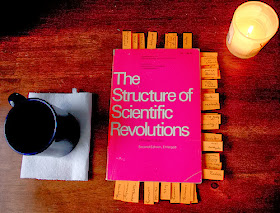The following are snipets from one of the most influencial and insightful books I have ever read. The book itself is quite comprehensive...and therefore contains many more sage and intelligent points than those I will mention here. The passages I will include here are from the first half of the book that essentially outline the nature of natural science and the "response to crisis"...but it is the first half that had the greatest impact on my personal and professional perspective on how to formulate strategy and how to go about the craft of searching for new frameworks and new solutions. Again, the following are passages from The Structure of Scientific Revolutions by Thomas Kuhn and therefore all credit goes to the author.
The Route to Normal Science
"To be accepted as a paradigm, a theory must seem better than its competitors, but it need not, and in fact never does, explain all the facts with which it can be confronted. (Normal science) suggests which experiments would be worth performing and which...would not."
"Truth emerges more readily from error than from confusion."
"The new paradigm implies a new and more rigid definition of the field. Those unwilling or unable to accomodate their work to it must proceed in isolation or attach themselves to some other group."
"In science, a paradigm is rarely an object for replication. Instead, ...it is an object for further articulation and specification under new or more stringent conditions. ...Paradigms gain their status because they are more successful than their competitors in solving a few problems that the group of practitioners has come to recognize as being acute."
Normal Science as Puzzle-solving
"Perhaps the most striking feature of the normal research problems we have just encountered is how little they aim to produce major novelties, conceptual or phenomenal."
The Response to Crisis
"Often a new paradigm emerges, at least in embryo, before a crisis has developed or been explicitely recognized."
"Crisis often proliferates new discoveries."
'The proliferation of competing articulations, the willingness to try anything, the expression of explicit discontent, the recourse to philosophy and to debate over fundamentals, all these are symptoms of a transition from normal to extraordinary research."
The Nature and Necessity of Scientific Revolutions
"Normal research, which is cumulative, owes its success to the ability of scientists regularly to select problems that can be solved with conceptual and instrumental techniques close to those already in existence."
To summarize, this book focuses on a deeper core concept of science...and even calls into question the very manner in which science is exacted. Further, it places a microscope over the intrinsic motivators and "drivers" of the scientist...is it real research if we already know the result? Is it real science if the parameters from which the study begins are entrenched within a specific paradigm? All of these are very good questions...and Kuhn manages to propel the concept of the necessity for revolutions of all types.
Very, VERY highly recommended read.

No comments:
Post a Comment